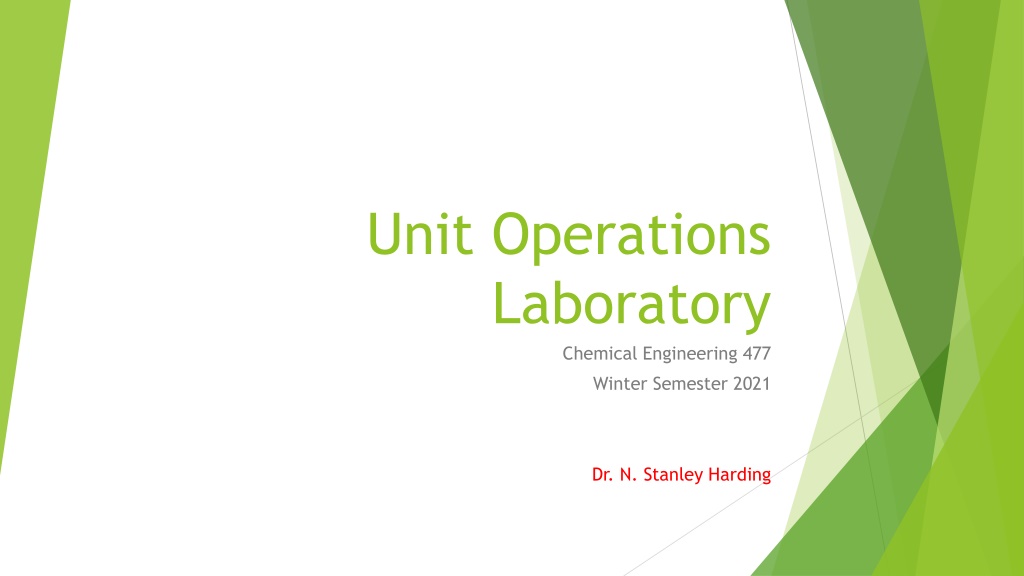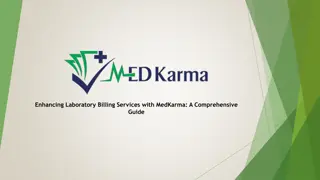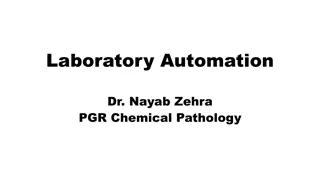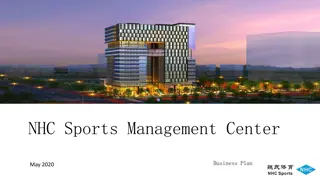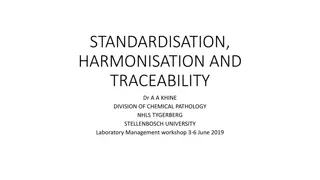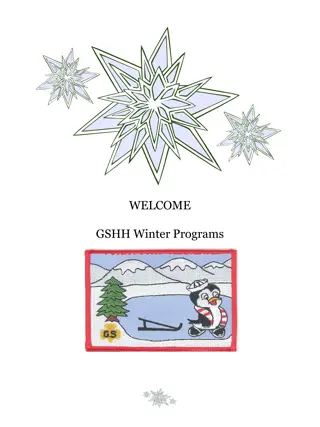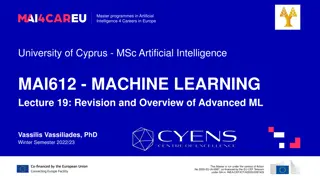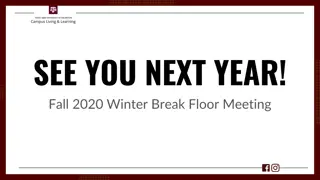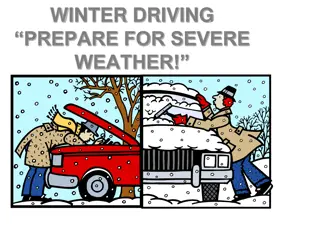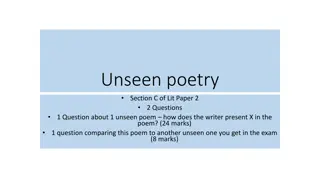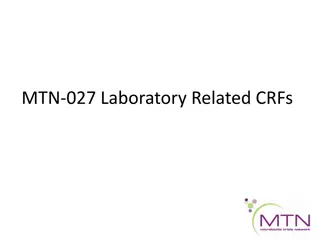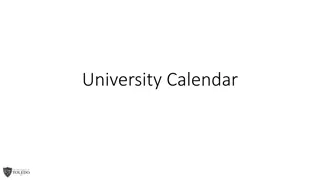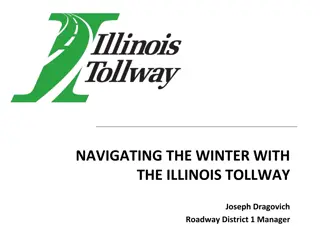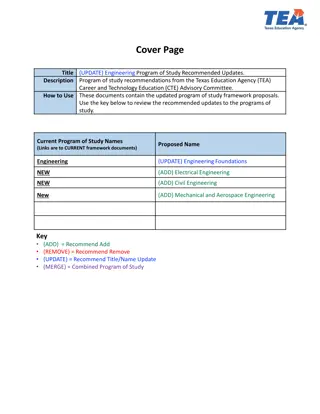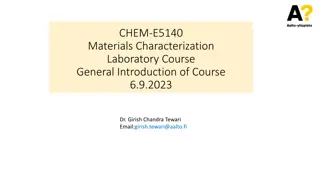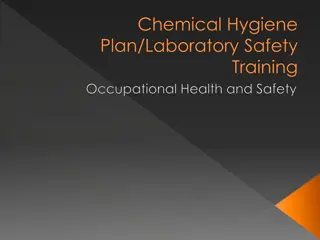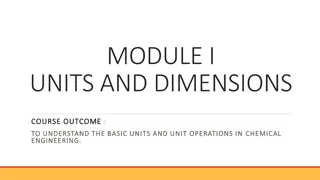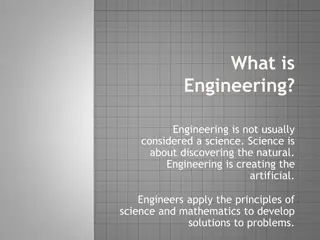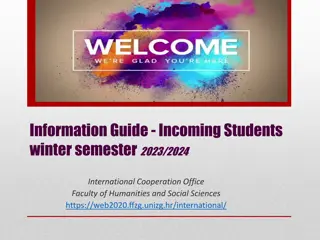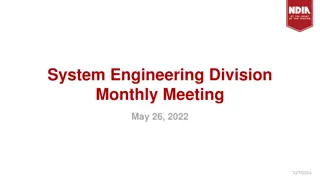Unit Operations Laboratory Chemical Engineering Winter Semester 2021
Dr. N. Stanley Harding, a seasoned Chemical Engineering professional, introduces the Chem. Eng. 477 Unit Operations II course focusing on transferring theoretical knowledge to practical experience. The laboratory experiments cover various engineering principles such as separations, continuous distillation, vapor-liquid equilibrium, kinetics, and catalytic methanation. Dr. Harding's vast experience and dedication to teaching enrich the students' learning journey, emphasizing teamwork and hands-on learning.
Uploaded on Oct 05, 2024 | 0 Views
Download Presentation

Please find below an Image/Link to download the presentation.
The content on the website is provided AS IS for your information and personal use only. It may not be sold, licensed, or shared on other websites without obtaining consent from the author. Download presentation by click this link. If you encounter any issues during the download, it is possible that the publisher has removed the file from their server.
E N D
Presentation Transcript
Unit Operations Laboratory Chemical Engineering 477 Winter Semester 2021 Dr. N. Stanley Harding
Chem. Eng. 477 Unit Operations II Purpose: Transfer book learning to actual experience Welcome Introduction Information Sheet Experiments Course Documents/Syllabus Experiment Proposals
Introduction Dr. N. Stanley Harding B.S. Chemical Engineering, BYU, 19XX Ph.D. Chemical Engineering, BYU, 19XX + 3 Work Experience Conoco/CONSOL/DuPont Established Combustion Group to support CONSOL, 9+ years Burns & Roe Engineering Services Technical support to DOE NETL, 1 year Reaction Engineering International Founding member, 10 years N. S. Harding & Associates Technical Energy Consultant, 20+ years This is my 20thyear as Adjunct Professor teaching at BYU! Last semester taught at both BYU and the UofU!
Introduction (Cont.) Dr. N. Stanley Harding Personal Live in North Salt Lake Married with 7 children, 17 grandchildren Read, write, and speak French All of family served LDS missions Enjoy crossword puzzles and math puzzles Run 4 marathons and 8 Ragnar 200 mile relays! Enjoy eating!! Why do I do this? Arrogant enough to think I can provide insights into reality (work place) Enjoy being with you kids
Laboratory Rules Safety glasses MUST be worn in lab No eating or drinking (except bottled water) in computer area or lab No open-toed shoes, sandals, etc. in lab No short pants in lab No skirts or dresses in lab Honor Code: beards, plagiarism, etc.
Laboratory Experience 2 Different Engineering Principles Separations Continuous Distillation; Ebulliometer (VLE) Kinetics Catalytic Methanation Everyone will get to do all three experiments There will be 6 teams, 4-5 students per team Change teams for each experiment Treat as if a project in company (proposals, reviews, reports, etc.) Teams will be given experimental data no actual testing
Team Concept TEAM succeeds, not the individual What are individual team member strengths? What part of experiment speaks to you? What are needed tasks? How do each persons strengths fit into TEAM success? How are these tasks divided between team members? Your Leadership report reflects your team members opinions of how you performed your tasks only
Major Sources of Help! Mike Beliveau Lab Director Amy Wood Lab Manager Your text books!
Course Documents On-line MUST read Syllabus Must sign and return signature page (January 13) On-line SHOULD be helpful Lectures Presentations Rubrics
Syllabus Schedule Subject to Change DATE 11-Jan 13-Jan 18-Jan 20-Jan 25-Jan 27-Jan 1-Feb 3-Feb 8-Feb 10-Feb 15-Feb 16-Feb 17-Feb 22-Feb 24-Feb 1-Mar 3-Mar 8-Mar 10-Mar Project #2: IND. Executive Summary 15-Mar Project #2: Presentation preparation 17-Mar Project #2: TEAM Presentations 22-Mar Project #3: New Teams; Prepare proposal 24-Mar Project #3: Experimental work 29-Mar Project #3: Experimental work 31-Mar Project #3: Experimental work 5-Apr Project #3: Experimental work 7-Apr Project #3: Experimental work 12-Apr Project #3: TEAM Formal Report preparation 14-Apr Project #3: Deliverables NOTE: *Items due at BEGINNING of class! Class Activity Notes and Instruction Prop.; Ldrshp.; Stats; App.; Writing Prog. Rpt.; Exec. Sum.; Assignment Due at End of Class Introduction; Safety; Lab Tour Presentations, Teams NO CLASS Project #1: Proposal Project #1: Experimental work Project #1: Experimental work Project #1: Experimental work Project #1: Experimental work Project #1: Experimental work Project #1: INDIVIDUAL Memo Report NO CLASS Project #2: New Teams; Prepare proposal Project #2: Teams; Prepare proposal Project #2: Experimental work Project #2: Experimental work Project #2: Experimental work Project #2: Experimental work Project #2: Experimental work Project #1 Proposal; Safety Sheet Project #1: Progress Report Project #1: IND. Memo Report*; App.*; Quiz*; Ldrshp. #1 Project #2: Proposal; Safety Sheet Monday Schedule Project #2: Progress Report **MEET IN CLASS TODAY** Project #2: Exec. Sum.*; App.*; Pres.*; Quiz*; Ldrshp. Rpt. Project #3: Proposal; Safety Sheet Project #3: Progress Report Project #3:TEAM Formal Rpt.*, Quiz*, App.*, Ldrshp. Rpt.
Assignment Values ASSIGNMENT VALUES Assignments Memo Report Ldrshp Report Quiz Exec. Summary Presnt. Critique Responsible Number Individual Individual Individual Individual Individual Value 100 15 30 100 30 Points 100 45 90 100 30 365 1 3 3 1 1 Individual Subtotal:* Proposals Progress Report Rpt. Appendix Formal Report Oral Presentation 1 per Team 1 per Team 1 per Team 1 per Team 1 per Team 3 3 3 1 1 40 20 50 100 100 120 60 150 100 100 530 Team Subtotal: Total Points: 895
